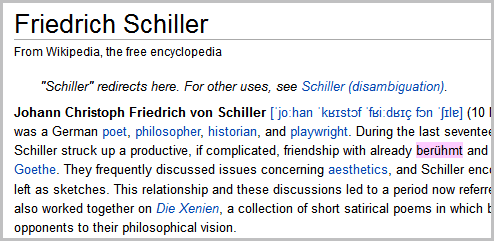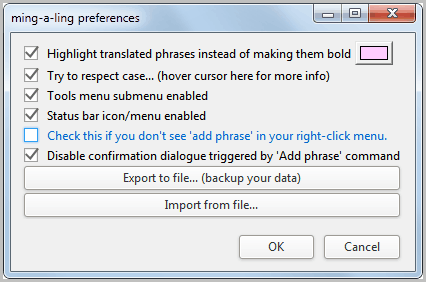Ming-A-Ling, Language Learning Add-On For Firefox

So, language learning. It can either be a pretty boring task, especially if you are in school and have to do it, or exciting, if you want to learn a language, for instance to read Goethe's Faust in German or Tolkins' Lord of the Rings in English. But even with all the excitement, a large part of learning a new language boils down to learning the language's vocabulary. That can be quite easy if the languages are closely related, say English and Danish (tree and træ, lamb and lam and so on) and a start at zero if they are not related, say English and Finnish (tree and puu, lamb and karitsa).
The Firefox add-on Ming-a-ling aids in the learning of vocabulary of one or multiple languages. Its approach is quite unique, as it replaces selected words on websites with words from the language you are learning. The idea is to create a connotation between words in your native language and words in the language that you are learning.
The sentence "we need to cut down the Baum" is a basic example. The English word tree was replaced by the German word Baum in the sentence.
So how does it work in detail? It would be quite problematic if the extension would start changing words right away, or to many words, or words that you do not know yet.
The first step in making best use of the language learning tool is to add words from your native language. This is done by selecting words on the page, right-clicking them and choosing Add Phrase. It is then necessary to pick the source language and the destination language. The translation is shown and needs to be confirmed. The word will be automatically displayed in the language that you are learning whenever it appears on a page. The selection of the source and destination language is only necessary once, and then only if languages need to be switched.
The words are automatically highlighted on the page. You can move the mouse over the word to see its translation in a tooltip.
The extension places an icon in the status bar which can be used to access its preferences, to change the source and destination language and the frequency of translations on pages.
The add-on preferences contain options to disable or change the highlighting of translated phrases, disable add-on menus and to import and export data sets.
A left-click on the add-on's icon in the Firefox status bar disables it, helpful if you need to work on something distraction free.
Ming-a-ling's theory is interesting: People learn the vocabulary of a language easier if they can connect those words into their native language's context. The setup may keep some users from utilizing the add-on to improve their vocabulary.
The developer should think about adding a stock of basic vocabularies to the add-on that can be activated directly, say the top 1000 words and phrases. It should be noted that this works best for languages that use the same, or a similar alphabet.
Interested users can download the Firefox add-on from the official Mozilla Firefox add-on repository. It is compatible with all versions of the web browser from Firefox 3.5 on.
Advertisement




















Martin, check out the spike you caused: http://www.cs.toronto.edu/~wehr/statistic_pic.tiff
I agree it’s a good idea about offering stock basic vocabularies. It’s been moving up and down my todo list since I started working on ming-a-ling. It’s a todo list that is constantly growing, though. Maybe I’ll find a way to poll users about which of a handful of improvements they think are most important.
That’s great :)
Very clever extension, Dustin. Interesting.
Martin’s suggestion of adding basic vocabularies
is one I think you should try to implement on ming-a-ling.
Seeing ming the Ming Dynasty comes to mind. Not minging.
I presume you picked ming for the alliterative qualities
and not any particular meaning for the word.
And ling for linguistics perhaps.
If you are contemplating a name change Dustin
I’ll submit ling-a-lang for your consideration.
Ling for linguistics and lang for language.
And alliteration is preserved as well.
Ming-A-Ling!?! What a minging name. Just doesn’t work in English.
Naming things is hard! You should use that wit for good and give me a better one. :-)
Ming-A-Ling = Mingle a Language – I get it!
The name chimes cheerfully when spoken aloud, but naming a side, the product most certainly works in English ;-)
Very helpfull!! Thank you. I’m going to try it right now